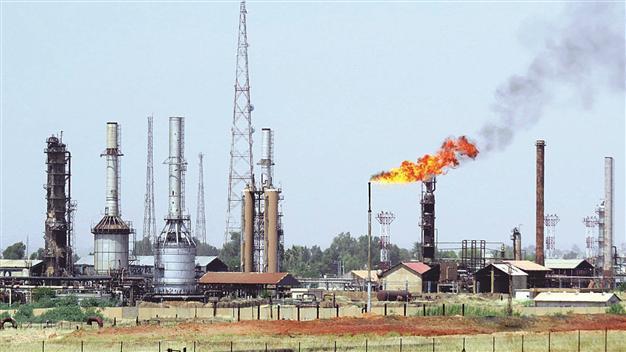No risk to Turkey’s oil supply from Iraqi violence, says energy minister
ANKARA

Flames rise at the Baba Gurur oil and gas facility south of Kirkuk. Minister Yıldız says Turkey’s energy security is immune to the clashes in the region.
Recent developments in Iraq do not pose risks to Turkey’s energy supply security because the oil flow from the Kirkuk-Ceyhan pipeline has been suspended for three months anyway, Turkish Energy Minister Taner Yıldız has said.“The latest developments in Iraq related to the energy sector do not affect Turkey’s crude oil security supply,” Yıldız said on June 13, seeking to assuade rising concerns.
The extending control of the jihadist militants of the Islamic State of Iraq and the Levant (ISIL) in Iraq, from where Turkey receives a considerable share of its oil supply, has sparked worries over the security of the pipelines and production fields.
Yıldız said the flow of oil at the Kirkuk-Yurmutalık pipeline, which is now controlled by ISIL, had been suspended for the past three months.
The oil flow through the line has been halted due to a series of violent attacks over the past few months.
Kirkuk, a major oil city in northern Iraq, was taken by the forces of northern Iraq’s Kurdistan Regional Government (KRG) from the central Iraqi authority on June 12.
The seizure came after the start of the unrest in the north and west of Iraq on June 10, when ISIL took control of the Iraqi province of Mosul. Ankara and Baghdad’s energy relations were already going through a rough patch due to dispute over Kurdish-controlled north’s oil exports to world from Turkish port of Ceyhan on the Mediterranean coast.
The shipping of oil extracted from the Kurdistan Regional Government (KRG) last month has chilled ties both between Baghdad and Ankara, and between the central government and Kurdish authorities in Arbil.
The cargo of Kurdish oil left Turkey 10 days ago aboard a United Leadership tanker, prompting Baghdad to file for international arbitration against Ankara for facilitating the sale.
Iraq says its State Oil Marketing Organization (SOMO) has exclusive rights to manage sales of crude from the entire country, including Kurdistan, and considers unilateral exports from the region as “smuggling.”
KRG oil plans continue: Company
Oil producer Gulf Keystone Petroleum said plans to increase production from its Shaikan oil field in Iraqi Kurdistan were on track despite escalating violence in the region. The firm said on June 13 three wells at Shaikan PF-1 were producing steadily at a rate of 16,000 gross barrels of oil per day (boed), a level that was set to rise to 20,000 later this year.
“Our operations in the Kurdistan Region of Iraq are progressing in line with our previous guidance, whilst we remain alert to the current security situation in Iraq, which has recently escalated outside the Kurdistan Region,” said Gulf Keystone Chief Executive Officer Todd Kozel.
















